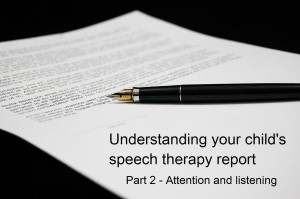Are you listening….. Then I’ll begin – by Elizabeth
Last week Helen started writing about the terminology we use when writing reports. Although we all try hard to explain ourselves as clearly as we can, we still have to use a certain amount of technical vocabulary, and things that make perfect sense to us may not to non-SLT’s. You can read that post here. So today I thought I would take a closer look at attention and listening skills.
Now this is a large and very important area. As Helen said last week, good attention and listening skills are a pre-requisite to learning all other skills. If you are not paying attention and listening it makes learning very hard.
Attention and listening skills are the foundation for all language development. We may see a child with very poor speech sounds, but if they can’t listen and follow instructions, they are not yet ready to work on their speech. Equally, when a child is referred because they aren’t talking, a parent may find it confusing that the therapist is only blowing bubbles and play posting games, not teaching the child words. But this is because we are working on the child’s attention and listening skills first.
When speech therapists talk about attention and listening skills there are a number of things we take into consideration; the child’s age, the setting – 1:1 or a group, the type of task and how motivating it is for the child. As with all skills, attention and listening skills develop over time and is something children get better at with practise.
Stage 1
Children are easily distracted by other things going on around them. They may only focus on one thing for a few seconds
Stage 2
Children can focus on an activity of their choosing for a short time. They do not like to be interrupted.
Stage 3
At this stage, children can only do one thing at a time. They find it hard to listen to an instruction while they are doing something else. They need to stop what they are doing and look at the speaker before they will listen to what is being said. It is important for parents and teachers to realise if a child is at this level. They must stop the child and ensure they have their attention before giving an instruction.
Stage 4
Children can still only focus on one thing at a time, but they are becoming more able to switch their focus from one thing to another without help.
Stage 5
Children can complete an activity and listen to an instruction at the same time, without necessarily needing to look at the speaker. Their attention spans may still be quite short, but they are able to join in a group activity.
Stage 6
Children are able to listen in a group or class for a long period of time. They can listen to information and instructions while they are doing something else, even if there is a lot going on around them.
Most children will have reached stage 6 by the age of 6 or 7. However all children develop differently and there is normal variation. Children with speech and language difficulties often have reduced attention and reach the stages a little later. You will also have children that don’t fit the pattern. I work with a number of children who look like they are staring out of the window, but they are in fact listening and concentrating really hard and can answer all your questions. They just find the eye contact distracting and so don’t look at the speaker.
There are a number of resources available to work on listening and attention skills. Many are paper based and require the child to listen to an instruction and then complete it. Some come with a cd to listen to. There are of course a number of apps as well. For older children, it can be useful to teach them strategies to help in the classroom. For example, remembering 2 key pieces of information from the teacher’s input, or writing down the key words to help them remember later. Hopefully your therapist will make some appropriate suggestions for your child. For some more ideas read Helen’s post about Maggie Johnson’s book here.
Look out for more in this series in the coming weeks. You can read the next part (which focusses on comprehension) here.







Leave a Reply